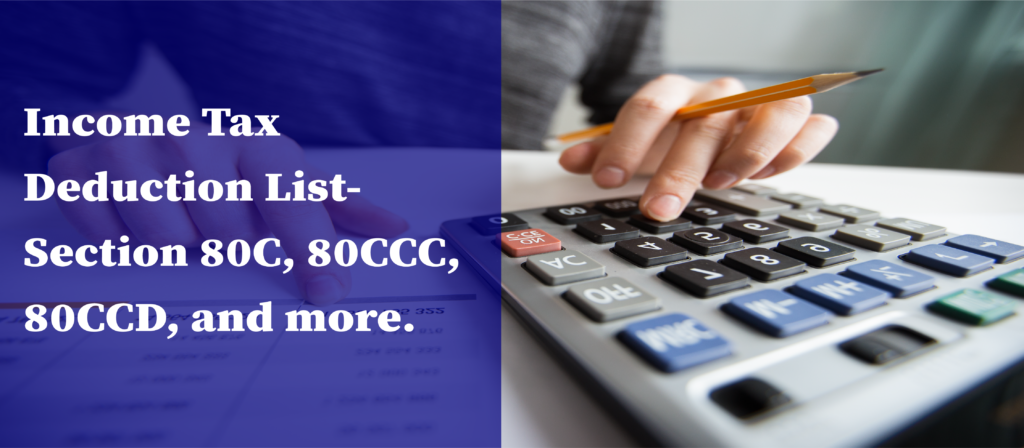
Income Tax Deduction List- Section 80C, 80CCC, 80CCD, and more.
When it comes to taxes, Section 80 of the Income Tax Act is a legal provision. It gives taxpayers a bunch of ways to deduct and exempt their income. Taxpayers must understand this section so they can plan their finances better and legally reduce how tax they owe.
Section 80 of the Income Tax Act is a part that includes sub-sections each offering particular tax deductions and exemptions. Its purpose is to incentivize individuals and businesses to save, invest, and contribute to the betterment of society.
In this blog post, we’ll explore the details of Tax Deductions under Section 80, why they matter, and why understanding tax deductions is so important.
5 Significance of Understanding Tax Deductions
1. Lowering Tax Responsibility:
Tax deductions play a role in reducing income resulting in a decreased tax responsibility. By utilizing the provisions outlined in Section 80, taxpayers can effectively plan their taxes. Ensure they only pay what is necessary.
2. Encouraging Investments and Savings:
Section 80 aims to promote savings and investments by providing deductions on instruments. This serves as an incentive for individuals to allocate their funds towards assets, thereby fostering growth and stability.
3. Financial Planning:
Knowing tax deductions empowers individuals to better plan their finances. It enables them to align their investments and expenses with term goals such as purchasing a home, funding education, or preparing for retirement.
4. Supporting Social Causes:
Through its encouragement of donations to organizations, Section 80 nurtures a culture of philanthropy. Allows taxpayers to actively contribute to social welfare.
5. Simplifying Tax Compliance:
Understanding tax deductions can streamline the process of filing taxes, making it more manageable for taxpayers to adhere to tax laws while avoiding mistakes and penalties.
Deductions and Eligibility under Section 80
Section 80C:
- Who can invest: This section is applicable, to individuals who are taxpayers and Hindu Undivided Families (HUFs).
- Eligibility requirement: To be eligible you can invest in designated instruments and expenses up to a maximum of ₹. 1.5 lakh in a single financial year.
- Investment & Expenses covered: The investments and expenses covered under this section include the Employee Provident Fund (EPF) Public Provident Fund (PPF) Equity Linked Savings Scheme (ELSS) National Savings Certificate (NSC) repayment of home loan principal, among others.
Section 80CCC:
- Who can invest: taxpayers and HUFs.
- Eligibility requirement: To claim deductions you can make investments in pension plans offered by life insurance companies.
- Investments covered: The maximum deduction allowed is ₹. 1.5 lakh when combining deductions, under both Section 80C and 80CCC.
Section 80CCD
- Who can invest: Taxpayers and HUFs.
- Eligibility requirement: Investment in the National Pension System (NPS) and claim deductions.
- Investment limit: Additional deduction up to ₹. 50000 is available under Section 80CCD.
Section 80D
- Who can invest: Taxpayers and HUFs.
- Eligibility requirements: This can be claimed on health insurance premiums paid.
- Deductions limit: Varies based on the age and health of a person.
Section 80DD
- Who can invest: Taxpayers and HUFs having dependents.
- Eligibility requirements: This can claimed for expenses incurred on medical treatment, training, and rehabilitation.
- Deductions limit: Normal disability ₹ 75000 and severe disability ₹ 125000.
Section 80DDB
- Who can invest: Taxpayers and HUFs.
- Eligibility requirements: This can be claimed for medical treatment expenses.
- Deductions limit: Senior citizens-upto ₹ 100000 and others up to ₹ 40000.
Section 80E
- Who can invest: Individual Taxpayer.
- Eligibility requirements: This can be claimed on interest paid for education loans taken for higher studies.
- Deductions: Available for a maximum of 8 years or until the interest is repaid, whichever is earlier.
Section 80EE
- Who can invest: Individual Taxpayer
- Eligibility requirements: This can be claimed on interest paid on a home loan for first-time homebuyers.
- Deductions limit: up to ₹ 50,000 per financial year, subject to conditions.
Section 80EEA
- Who can invest: Individual Taxpayer.
- Eligibility requirements: This can be claimed on interest paid on loans taken for affordable housing.
- Deductions limit: up to ₹ 1.5 lacks per financial year, subject to conditions.
Section 80EEB
- Who can invest: Individual Taxpayer
- Eligibility requirements: This can be claimed on interest paid on loans taken for a vehicle purchase.
- Deductions limit: up to ₹ 1.5 lacks per financial year, subject to conditions.
Section 80G
- Who can invest: Individual Taxpayer and HUFs
- Eligibility requirements: This can be claimed on donations made to registered charitable organizations.
- Deductions limit: Varies based on the charitable organization.
Section 80GG
- Who can invest: Taxpayers who don’t receive house rent allowance
- Eligibility requirements: This can be claimed for rent paid for accommodation if a home rent allowance is not received.
- Deductions limit: The least of 25% of total income, paid rent minus 10% total income or ₹ 5000 monthly.
Section 80GGA
- Who can invest: Taxpayers who make donations for rural development and scientific research.
- Eligibility requirements: This can be claimed on donations made to research entities or activities for rural development.
- Deductions limit: Entire donation amount.
Section 80GGB
- Who can invest: Companies that make donations to political parties
- Eligibility requirements: This can be claimed on contributions made to political parties.
- Deductions: Entire donation amount.
Section 80GGC
- Who can invest: Taxpayers who make donations to political parties
- Eligibility requirements: This can be claimed on contributions made to political parties.
- Deductions: Entire donation amount.
Section 80RRB
- Who can invest: Individual taxpayer
- Eligibility requirements: This can be claimed by authors of specific types of royalty income.
- Deductions limit: ₹ 3,00,000/- or income whichever is lower.
Section 80TTA
- Who can invest: Individual Taxpayer and HUFs
- Eligibility requirements: This be claimed on interest earned from the savings account.
- Deductions limit: up to ₹. 10000 in a financial year.
Section 80TTB
- Who can invest: Senior citizens
- Eligibility requirements: This can be claimed on interest income earned from deposits.
- Deductions limit: up to ₹ 50000 in a financial year.
Section 80U
- Who can invest: Individual Taxpayer
- Eligibility requirements: This can be claimed if you have any disability.
- Deductions limit: Normal disability ₹ 75000 and Severe disability ₹ 125000.
For more information visit- Cleartax.in.
Features of Income Tax Deductions under Section 80
Here are some key features of income tax deductions under this section:
Diverse options:
This Section offers a variety of deduction choices with different subsections catering to investments, expenses, and contributions. Taxpayers are given the freedom to select from a range of options that align with their objectives and tolerance, for risk.
Reducing Taxable Income:
The deductions mentioned in this Section have an impact, on the taxpayer’s income effectively lowering it by the claimed amount.
Encouragement:
This Section is designed to incentivize taxpayers to make investments, in instruments and savings schemes. It aims to cultivate a culture of saving and encourage term planning.
Social contribution:
The government provides incentives for individuals to make contributions by offering deductions under Section 80G. This means that if you donate to registered organizations you can enjoy tax benefits.
Supporting philanthropy:
The provisions of Section 80GGA and 80GGC donations made towards scientific research, rural development, and political contributions play a significant role, in facilitating philanthropy and benefiting society as a whole.
Fostering Homeownership:
Tax deductions such, as Section 80EE, 80EEA, and 80EEB aim to support individuals in becoming homeowners by offering benefits on the interest payments of home loans. These deductions specifically target first-time homebuyers and those seeking affordable housing options.
Educational empowerment:
Section 80E aims to facilitate individuals’ pursuit of education by providing deductions, on the interest paid towards loans. This provision assists both students and their parents in planning for education.
Healthcare support:
You can receive support, for your healthcare expenses through two sections, 80D and 80DDB. These sections offer deductions on health insurance premiums and medical treatment costs, for diseases respectively.
Assistance for disabled persons:
People, with disabilities can receive assistance through Sections 80DD, 80DDB, and 80U. These sections provide deductions, for treatment and rehabilitation expenses.
Cultivating Environmental Responsibility:
Section 80EEB aims to incentivize the use of vehicles by offering tax advantages, on loans obtained to acquire these friendly modes of transportation.
Key Takeaways
Every taxpayer must understand the importance of tax deductions provided under Section 80 of the Income Tax Act. These deductions offer individuals the opportunity to lower their tax obligations, effectively plan their finances, and secure their future. It is essential to make the most of Section 80 deductions to enjoy the advantages of savings, healthcare coverage, and contributions towards causes. To maximize tax savings, it is advisable to make decisions such as investing in tax-saving instruments and donating to eligible charities. With this knowledge, taxpayers can confidently navigate through the complexities of taxation while exercising prudence.
Contact us today to learn more about how we can help you!
